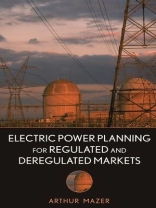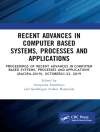As the industry environment transforms from a completely regulated
setting to a broader, deregulated marketplace, new market
participants must understand planning and operations of power
systems to effectively participate in markets. This industry
overview provides a description of utility operations and
traditional planning, and then explains asset management,
investment analysis, and risk management within the context of a
market environment. Written to provide a broad, working knowledge
of the industry, Electric Power Planning for Regulated and
Deregulated Markets:
* Includes descriptions of generation and transmission network
equipment
* Provides an overview of the regulatory framework, system design
and systems operations for ensuring reliable delivery of power
* Presents system planning across different time horizons with
the objective of minimizing power production costs
* Explains the principles and architecture of a market
environment coupling operational imperatives with financial
transactions
* Addresses approaches of various participants, including
power producers, retailers, and integrated energy companies toward
bidding in day ahead markets, managing risks in forward markets,
portfolio development and investment analysis
* Provides numerous examples addressing cost minimization, price
forecasting, contract valuation, portfolio risk measurement and
others
* Examines past news events and explains what went wrong at Three
Mile Island, the Northeast blackout of 2003, and the California
energy crisis
This is an ideal reference for professionals in the public and
private power service sectors such as engineers, lawyers, systems
specialists, economists, financial analysts, policy analysts, and
applied mathematicians.
İçerik tablosu
Preface xi
Acknowledgments xv
Figure Citations xvii
About the Author xix
1. Overview 1
1.1 The Power Delivery Chain in a Vertically Integrated Utility 1
1.2 The Power Delivery Chain in a Market Environment 3
2. Energy, Load, and Generation Technologies 7
2.1 Energy, Power, and their Measurements 7
2.2 Load 14
2.3 Generation Technologies 21
3. The Grid 49
3.1 Fundamentals: Load, Generation, and Alternating Current 49
3.2 Grid Equipment 56
3.3 Grid Reliability and Contingency Requirements 64
3.4 Grid Configuration 67
3.5 Grid Operations 72
3.6 Blackout August 14, 2003 76
4. Short-Term Utility Planning 81
4.1 Planning and Execution of Dispatch: Day-Ahead Planning Through Real-Time Delivery 81
4.2 Day-Ahead Demand Forecasting: Load and Ancillary Service Requirements 84
4.3 Least-Cost Dispatch in a Single Control Area: A Simple Model 89
4.4 A Solution Using Profit Maximization 95
4.5 Least-Cost Dispatch in a Single Control Area with Operating Constraints 99
4.6 Least-Cost Dispatch in a Single Node with Spinning Reserve and Regulation 111
4.7 Least-Cost Dispatch in a Network 113
4.8 Real Time 120
5. Long-Term Utility Planning 122
5.1 Project Development 122
5.2 The Planning Process 127
5.3 Long-Term Load Forecasting 129
5.4 A Simplified Look at Generation Capacity Additions 131
5.5 Generation Additions and Retirements Within a Single Control Area 143
5.6 Generation Additions and Retirements with Transmission to a Single Control Area 147
5.7 Generation Additions and Retirements and Transmission Additions Within a Network 148
5.8 Reserve Reuqirements 151
6. Midterm Utility Planning 152
6.1 Informational Requirements 152
6.2 Formulation of the Optimization Problem 156
7. A Market Environment 161
7.1 Principles and Architecture 161
7.2 Short-Term Market Design: Day-Ahead Scheduling Through Real-Time Delivery 164
7.3 Long-Term Market Design: No Clear Solutions 170
7.4 Midterm Market Design 173
8. Asset Management in Short-Term Markets 180
8.1 Retailers 180
8.2 Power Producers 183
8.3 Integrated Energy Companies 189
9. Investment Analysis: Long-Term Planning in a Market Environment 192
9.1 Investment Setting in Utility and Market Environments 192
9.2 Project Analysis for a Merchant Plant 193
9.3 Power Purchase Agreements (Long-Term Contracts) 202
10. Risk Management in the Midterm Markets 211
10.1 Retailer Risk 211
10.2 Power Producer Risk 214
10.3 A Quick Risk Primer in Statistics for Risk Management 215
10.4 Risk Management in Midterm Markets: Retailers 229
10.5 Risk Management in Midterm Markets: Power Producers 252
10.6 Risk Management in Midterm Markets: Integrated Electricity Suppliers 274
11. The California Experience 278
11.1 Market Fundamentals 279
11.2 Short-Term Market Structure: The CALPX, CAISO, and Other Market Participants 281
11.3 Fatboy, Get Shorty, Ricochet, and Death Star 286
11.4 Market Contrast: PJM and California 288
Bibliography 291
Index 294
Yazar hakkında
Arthur Mazer, Ph D, MBA, is Manager of Forward Transactions Planning at Southern California Edison, where he oversees the risk assessment of SCE’s power, gas, and customer portfolio, as well as valuation and selection of power and gas contracts. He previously held positions at Electrabel, Progress Energy, and Entergy Power Marketing Corp. Additionally, he was visiting assistant professor at Utah State University and a lecturer at Singapore Polytechnic, both in the Department of Mathematics.












